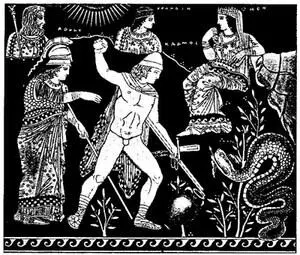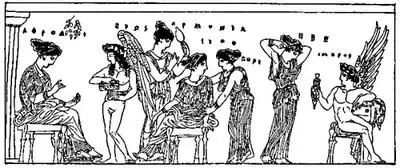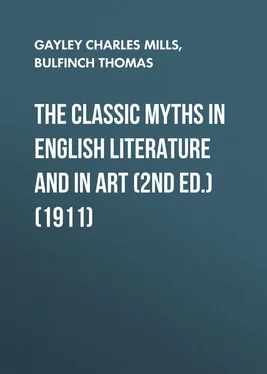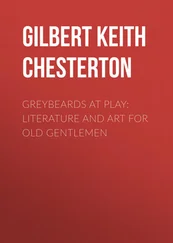Thomas Bulfinch - The Classic Myths in English Literature and in Art (2nd ed.) (1911)
Здесь есть возможность читать онлайн «Thomas Bulfinch - The Classic Myths in English Literature and in Art (2nd ed.) (1911)» — ознакомительный отрывок электронной книги совершенно бесплатно, а после прочтения отрывка купить полную версию. В некоторых случаях можно слушать аудио, скачать через торрент в формате fb2 и присутствует краткое содержание. Жанр: foreign_antique, foreign_prose, на английском языке. Описание произведения, (предисловие) а так же отзывы посетителей доступны на портале библиотеки ЛибКат.
- Название:The Classic Myths in English Literature and in Art (2nd ed.) (1911)
- Автор:
- Жанр:
- Год:неизвестен
- ISBN:нет данных
- Рейтинг книги:4 / 5. Голосов: 1
-
Избранное:Добавить в избранное
- Отзывы:
-
Ваша оценка:
- 80
- 1
- 2
- 3
- 4
- 5
The Classic Myths in English Literature and in Art (2nd ed.) (1911): краткое содержание, описание и аннотация
Предлагаем к чтению аннотацию, описание, краткое содержание или предисловие (зависит от того, что написал сам автор книги «The Classic Myths in English Literature and in Art (2nd ed.) (1911)»). Если вы не нашли необходимую информацию о книге — напишите в комментариях, мы постараемся отыскать её.
The Classic Myths in English Literature and in Art (2nd ed.) (1911) — читать онлайн ознакомительный отрывок
Ниже представлен текст книги, разбитый по страницам. Система сохранения места последней прочитанной страницы, позволяет с удобством читать онлайн бесплатно книгу «The Classic Myths in English Literature and in Art (2nd ed.) (1911)», без необходимости каждый раз заново искать на чём Вы остановились. Поставьте закладку, и сможете в любой момент перейти на страницу, на которой закончили чтение.
Интервал:
Закладка:
Then Jupiter the cloud-gatherer looked sternly at him, and said: "Nay, thou renegade, sit not by me and whine. Most hateful to me art thou of all gods that dwell in Olympus; thou ever lovest strife and wars and battles. Truly thy mother's spirit is intolerable, unyielding, even Juno's; her can I scarce rule with words. Therefore I deem that by her prompting thou art in this plight. Yet will I no longer endure to see thee in anguish; mine offspring art thou, and to me thy mother bare thee. But wert thou born of any other god unto this violence, long ere this hadst thou been lower than the sons of Heaven."
So spake he and bade Pæan heal him. And Pæan laid assuaging drugs upon the wound, and healed him, seeing he was in no wise of mortal mold. Even as fig juice maketh haste to thicken white milk, that is liquid but curdleth speedily as a man stirreth, even so swiftly healed he impetuous Mars. And Hebe bathed him and clothed him in gracious raiment, and he sate down by Jupiter, son of Cronus, glorying in his might.
Then fared the twain back to the mansion of great Jupiter, even Juno and Minerva, having stayed Mars, scourge of mortals, from his man-slaying. 84 84 Iliad, 5, 850 et seq. (Lang, Leaf, and Myers' translation). In accordance with the system of nomenclature adopted in this work, Latin equivalents are given, wherever possible, for Greek names.
69. Mars and Minerva.It would seem that the insatiate son of Juno should have learned by this sad experience to avoid measuring arms with the ægis-bearing Minerva. But he renewed the contest at a later period in the fortunes of the Trojan War:
… Jupiter knew what was coming as he sat upon Olympus, and his heart within him laughed pleasantly when he beheld that strife of gods. Then no longer stood they asunder, for Mars, piercer of shields, began the battle and first made for Minerva with his bronze spear, and spake a taunting word: "Wherefore, O dogfly, dost thou match gods with gods in strife, with stormy daring, as thy great spirit moveth thee? Rememberest thou not how thou movedst Diomede, Tydeus' son, to wound me, and thyself didst take a visible spear and thrust it straight at me and pierce through my fair skin? Therefore deem I now that thou shalt pay me for all that thou hast done."
Thus saying, he smote on the dread tasseled ægis that not even the lightning of Jupiter can overcome – thereon smote blood-stained Mars with his long spear. But she, giving back, grasped with stout hand a stone that lay upon the plain, black, rugged, huge, which men of old time set to be the landmark of a field; this hurled she, and smote impetuous Mars on the neck, and unstrung his limbs. Seven roods he covered in his fall, and soiled his hair with dust, and his armor rang upon him. And Minerva laughed, and spake to him winged words exultingly: "Fool, not even yet hast thou learnt how far better than thou I claim to be, that thus thou matchest thy might with mine. Thus shalt thou satisfy thy mother's curses, who deviseth mischief against thee in her wrath, for that thou hast left the Achæans and givest the proud Trojans aid."
Thus having said, she turned from him her shining eyes. Him did Venus, daughter of Jupiter, take by the hand and lead away, groaning continually, for scarce gathered he his spirit back to him. 85 85 Iliad, 21, 390 (Lang, Leaf, and Myers' translation).
70. The Fortunes of Cadmus.Toward mortals Mars could show himself, on occasion, as vindictive as his fair foe, the unwearied daughter of Jove. This fact not only Cadmus, who slew a serpent sacred to Mars, but all the family of Cadmus found out to their cost.

Fig. 54. Cadmus slaying the Dragon
When Europa was carried away by Jupiter in the guise of a bull, her father Agenor commanded his son Cadmus to go in search of her and not to return without her. Cadmus sought long and far; then, not daring to return unsuccessful, consulted the oracle of Apollo to know what country he should settle in. The oracle informed him that he would find a cow in the field, should follow her wherever she might wander, and where she stopped should build a city and call it Thebes. Cadmus had hardly left the Castalian cave, from which the oracle was delivered, when he saw a young cow slowly walking before him. He followed her close, offering at the same time his prayers to Phœbus. The cow went on till she passed the shallow channel of Cephissus and came out into the plain of Panope. There she stood still. Cadmus gave thanks, and stooping down kissed the foreign soil, then lifting his eyes, greeted the surrounding mountains. Wishing to offer a sacrifice to his protecting deity, Minerva, he sent his servants to seek pure water for a libation. Near by there stood an ancient grove which had never been profaned by the ax, in the midst of which was a cave thick covered with the growth of bushes, its roof forming a low arch from beneath which burst forth a fountain of purest water. But in the cave lurked a serpent with crested head, and scales glittering like gold; his eyes shone like fire; his body was swollen with venom; he vibrated a triple tongue and showed a triple row of teeth. No sooner had the Tyrians dipped their pitchers in the fountain and the in-gushing waters had made a sound, than the monster, twisting his scaly body in a huge coil, darted upon them and destroyed some with his fangs, others in his folds, and others with his poisonous breath.
Cadmus, having waited for the return of his men till midday, went in search of them. When he entered the wood and saw their lifeless bodies and the dragon with his bloody jaws, not knowing that the serpent was sacred to Mars, scourge of mortals, he lifted a huge stone and threw it with all his force at the monster. The blow made no impression. Minerva, however, was present, unseen, to aid her worshiper. Cadmus next threw his javelin, which penetrated the serpent's scales and pierced through to his entrails. The monster attempted to draw out the weapon with his mouth, but broke it off, leaving the iron point rankling in his flesh. His neck swelled with rage, bloody foam covered his jaws, and the breath of his nostrils poisoned the air around. As he moved onward, Cadmus retreated before him, holding his spear opposite to the serpent's opened jaws. At last, watching his chance, the hero thrust the spear at a moment when the animal's head thrown back came against the trunk of a tree, and so succeeded in pinning him to its side.
While Cadmus stood over his conquered foe, contemplating its vast size, a voice was heard (from whence he knew not, but it was Minerva's) commanding him to take the dragon's teeth and sow them in the earth. Scarce had he done so when the clods began to move and the points of spears to appear above the surface. Next, helmets with their nodding plumes came up; next, the shoulders and breasts and limbs of men with weapons, and in time a harvest of armed warriors. Cadmus prepared to encounter a new enemy, but one of them said to him, "Meddle not with our civil war." With that he who had spoken smote one of his earthborn brothers with a sword, and he himself fell pierced with an arrow from another. The latter fell victim to a fourth, and in like manner the whole crowd dealt with each other till all but five fell slain. These five joined with Cadmus in building his city, to which they gave the name appointed.

FIG. 55. Harmonia in Company of Deities
As penance for the destruction of this sacred serpent, Cadmus served Mars for a period of eight years. After he had been absolved of his impiety, Minerva set him over the realm of Thebes, and Jove gave him to wife Harmonia, the daughter of Venus and Mars. The gods left Olympus to honor the occasion with their presence; and Vulcan presented the bride with a necklace of surpassing brilliancy, his own workmanship. Of this marriage were born four daughters, Semele, Ino, Autonoë, and Agave, and one son, Polydorus. But in spite of the atonement made by Cadmus, a fatality hung over the family. The very necklace of Vulcan seemed to catch the spirit of ill luck and convey a baleful influence to such as wore it. Semele, Ino, Actæon the son of Autonoë, and Pentheus the son of Agave, all perished by violence. Cadmus and Harmonia quitted Thebes, grown odious to them, and emigrated to the country of the Enchelians, who received them with honor and made Cadmus their king. But the misfortunes of their children still weighing upon their minds, Cadmus one day exclaimed, "If a serpent's life is so dear to the gods, I would I were myself a serpent." No sooner had he uttered the words than he began to change his form. Harmonia, beholding it, prayed the gods to let her share his fate. Both became serpents. It is said that, mindful of their origin, they neither avoid the presence of man nor do they injure any one. But the curse appears not to have passed from their house until the sons of their great-great-grandson Œdipus had by fraternal strife ended themselves and the family. 86 86 Ovid, Metam. 3, 1-137; 4, 563-614.
Интервал:
Закладка:
Похожие книги на «The Classic Myths in English Literature and in Art (2nd ed.) (1911)»
Представляем Вашему вниманию похожие книги на «The Classic Myths in English Literature and in Art (2nd ed.) (1911)» списком для выбора. Мы отобрали схожую по названию и смыслу литературу в надежде предоставить читателям больше вариантов отыскать новые, интересные, ещё непрочитанные произведения.
Обсуждение, отзывы о книге «The Classic Myths in English Literature and in Art (2nd ed.) (1911)» и просто собственные мнения читателей. Оставьте ваши комментарии, напишите, что Вы думаете о произведении, его смысле или главных героях. Укажите что конкретно понравилось, а что нет, и почему Вы так считаете.












